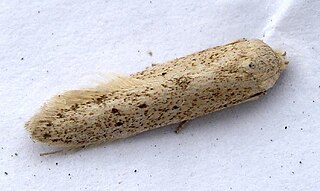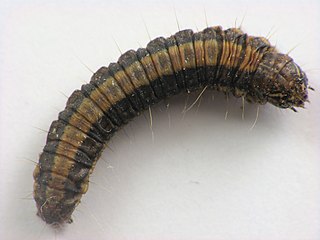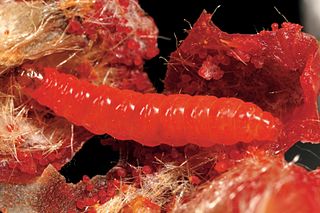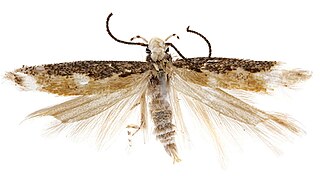| Paramorpha | |
|---|---|
 | |
| Paramorpha marginata | |
| Scientific classification | |
| Kingdom: | |
| Phylum: | |
| Class: | |
| Order: | |
| Family: | |
| Genus: | Paramorpha Meyrick, 1881 |
Paramorpha is a genus of moths in the Carposinidae family.
| Paramorpha | |
|---|---|
 | |
| Paramorpha marginata | |
| Scientific classification | |
| Kingdom: | |
| Phylum: | |
| Class: | |
| Order: | |
| Family: | |
| Genus: | Paramorpha Meyrick, 1881 |
Paramorpha is a genus of moths in the Carposinidae family.

The Archipini are a tribe of tortrix moths. Since many genera of these are not yet assigned to tribes, the genus list presented here is provisional.

Aristotelia is a genus of moths in the family Gelechiidae. Well-known species are food plant specialists, and diverse hosts are used – Salicaceae, Solanaceae, Rosaceae, Fagaceae, Fabaceae, Asteraceae.

Brachmia is a genus of the twirler moth family (Gelechiidae). Among these, it is mostly placed in the subfamily Dichomeridinae.

Dichomeris is a genus of moths in the family Gelechiidae erected by Jacob Hübner in 1818.

Hypatima is a genus of the twirler moth family (Gelechiidae). Among these, it belongs to a distinct lineage, which is variously treated as tribe Chelariini in subfamilies Dichomeridinae, Gelechiinae, or even Pexicopiinae, and historically was considered a subfamily in its own right, Chelariinae. Of this lineage, Hypatima – under its junior synonym Chelaria – is the type genus. This genus has numerous species, but its exact limits are not quite clear. This genus occurs mainly in the Southern Hemisphere, though one of the better-known species is the only member of this genus native to Europe, the lobster-clawed moth.

Blastobasis is the type genus of the gelechioid moth family Blastobasidae; in some arrangements these are placed in the case-bearer family (Coleophoridae) as a subfamily. Within the Blastobasidae, the subfamily Blastobasinae has been established to distinguish the Blastobasis lineage from the group around Holcocera, but the delimitation is not yet well-resolved.
Imma is a large genus of moths in the obtectomeran "micromoth" family Immidae. This is the type genus of its family. They are widespread in the tropics, with most species occurring between the Himalayas and the Oceanian region; the genus is furthermore plentiful in the Neotropics, but not very diverse in the Afrotropics.

Lecithocera is a genus of moths in the lecithocerid subfamily Lecithocerinae. The genus was erected by Gottlieb August Wilhelm Herrich-Schäffer in 1853.

Zelleria is a genus of moths of the family Yponomeutidae.

Platyptilia is a genus of moths in the family Pterophoridae. The genus was described by Jacob Hübner in 1825.

The Oecophorinae are the nominate subfamily of moths in the concealer moth family (Oecophoridae). They are part of the insufficiently studied superfamily Gelechioidea, and like their relatives, the circumscription of this taxon is disputed.

Epicephala is a genus of moths in the family Gracillariidae.

Caloptilia is a genus of moths in the family Gracillariidae.

Acrocercops is a genus of moths in the family Gracillariidae.

Paramorpha marginata is a species of moth in the family Carposinidae. It is endemic to New Zealand and has been observed in the northern parts of the North Island. It has been observed in the canopy of kanuka forest and has been collected and reared from leaf litter beneath Leucopogon fasciculatus. It is regarded as a rarely recorded species.

The Epipaschiinae are a subfamily of snout moths. Almost 600 species are known today, which are found mainly in the tropics and subtropics. Some occur in temperate regions, but the subfamily is apparently completely absent from Europe, at least as native species. A few Epipaschiinae are crop pests that may occasionally become economically significant.

Agriophara colligatella, also known as the Olearia Skeletoniser, is a moth of the family Depressariidae. It is endemic to New Zealand and is found on both the North and South Islands. This species inhabits native scrub. Larvae feed on the leaves of species in the genus Olearia during the months of November and December. They then pupate amongst the old flowers and leaves of their host plant. Adults have been observed on the wing from August to September but are most common in January. It has been hypothesised that this species overwinters as an adult as it has been observed on the wing in late autumn and early winter. Adults are attracted to light.

Carposina is a genus of moths in the Carposinidae family.
Heterogymna is a genus of moths in the Carposinidae family.

Gelechiinae is a subfamily of moths in the family Gelechiidae. It was described by Henry Tibbats Stainton in 1854.